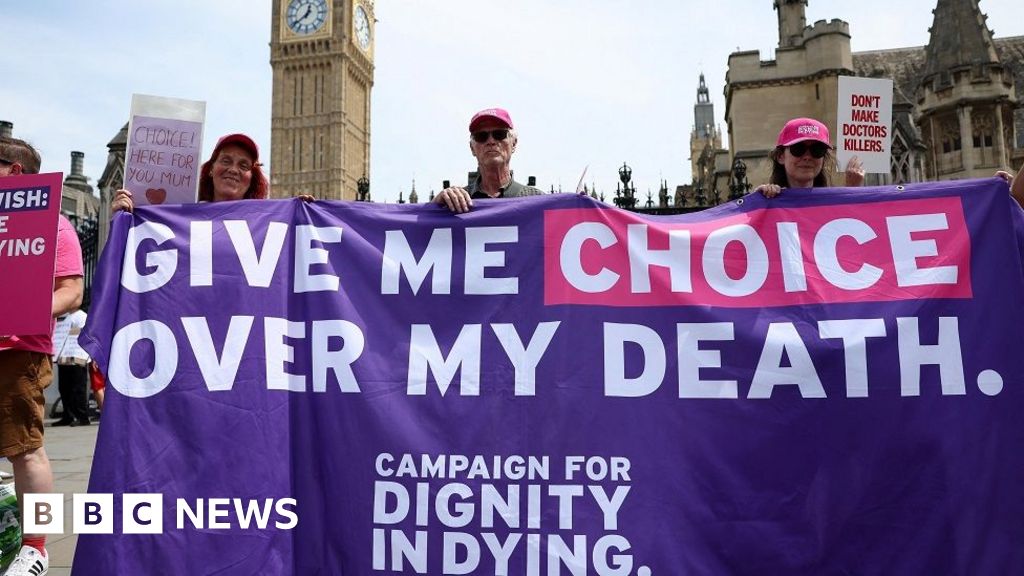Take a step back, and it has been quite a few days. This has been a week at Westminster that has seen two decisions that point to a profound, socially liberal shift. Just a few days ago, MPsvoted to change abortion legislationto stop women in England and Wales being prosecuted for ending their pregnancy. And now, the Commons has backed a change in the law in England and Wales to allow assisted dying, or, as some opponents call it, assisted suicide. This vote doesn't guarantee this will happen - it will head next to the House of Lords - but it is now likely, even highly likely. It is a colossal social change, compared by many to the Abortion Act of 1967, the abolition of capital punishment, the decriminalisation of homosexuality and the introduction of gay marriage. MPs had a free vote in both of this week's votes. But it is also true that the change in the composition of the Commons at the general election - and, in particular, the arrival of hundreds of new Labour MPs - has created the climate and the mood in parliament that has allowed both these votes to pass. Opinion polls have consistently pointed to significant public support for a change in the law. A YouGov poll earlier this weeksuggested over seven in ten Britons supported these assisted dying proposals. But MPs today were conscious of stepping beyond a discussion of the principles of this idea to scrutiny of the practicalities of this particular bill. Plenty of opponents told the Commons they believed in a change in the law in principle, but were opposed to this particular bill. And yet, in the end, MPs have said yes to this change in the law - and so this is a hugely significant, unprecedented moment. In 2015, theCommons rejected changing the law. It did so in 1997 too. Not this time. The arguments were no less passionate. Even the terminology is fought over. While plenty use the shorthand of "assisted dying," for some opponents this is a misnomer. It should, instead, they argue, be called "assisted suicide" or "assisted killing". Those arguments will continue, but what will now happen is this bill will head to the House of Lords. Having been endorsed by the Commons, proponents believe that while peers will scrutinise and likely amend this bill, they are confident it will now become law, in time. Sign up for our Politics Essential newsletterto keep up with the inner workings of Westminster and beyond.
Chris Mason: Profound social change that is now likely to become law
TruthLens AI Suggested Headline:
"House of Commons Votes in Favor of Assisted Dying Legislation"
TruthLens AI Summary
This week has marked a significant turning point in the legislative landscape of England and Wales, characterized by two pivotal votes in the House of Commons that signal a shift towards more socially liberal policies. The first of these votes saw Members of Parliament (MPs) agree to alter abortion legislation, aiming to decriminalize the act of terminating a pregnancy. Following closely on its heels, the Commons has also voted in favor of a change in the law concerning assisted dying, a topic that has sparked considerable debate and controversy. While the passage of this vote does not immediately guarantee that assisted dying will become legal, it has set the stage for further examination and potential enactment, as the bill now progresses to the House of Lords. This momentous legislative activity has drawn comparisons to historic milestones in social reform, such as the Abortion Act of 1967 and the legalization of same-sex marriage, reflecting a broader transformation in societal attitudes towards personal autonomy and end-of-life choices.
The recent decisions in Westminster underscore the evolving composition of Parliament, particularly influenced by the influx of new Labour MPs following the last general election. Public sentiment appears to be in favor of these changes, as evidenced by a recent YouGov poll indicating that over 70% of Britons support the proposals for assisted dying. Despite the overwhelming support, the debate remains complex, with some MPs expressing their opposition to the specific bill rather than the concept of assisted dying itself. Terminology surrounding the issue also plays a critical role, with advocates and opponents alike engaging in a semantic battle over terms such as "assisted dying" versus "assisted suicide." As the bill heads to the House of Lords, supporters are optimistic that it will undergo scrutiny and potentially amendments but ultimately lead to a new legal framework that reflects the changing societal values surrounding these deeply personal issues.
TruthLens AI Analysis
You need to be a member to generate the AI analysis for this article.
Log In to Generate AnalysisNot a member yet? Register for free.
